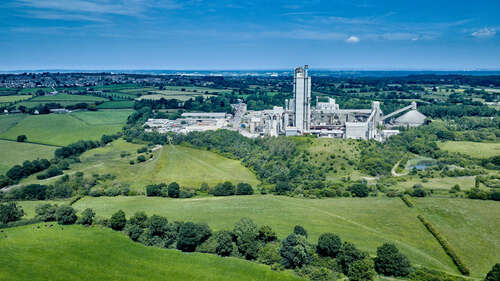Heidelberg Materials takes Final Investment Decision for CCS project in UK – construction will start this year
- Heidelberg Materials and the UK Government have reached a funding agreement to build the world’s first carbon capture facility that enables the fully-decarbonised production of cement at the Padeswood, UK, plant
- The project in North Wales will make Heidelberg Materials’ Padeswood site the company’s second plant to deliver net-zero carbon captured evoZero® cement to customers across Europe
- Padeswood represents Heidelberg Materials’, and the world’s, second industrial-scale CCS initiative in the cement sector to reach Final Investment Decision (FID)
- Following the recently opened Brevik CCS facility with 50% capture capacity, the new facility in Padeswood is designed to capture nearly all of the plant’s CO₂ emissions and will be operational by 2029
Following the successful completion of a funding agreement with the UK Government, Heidelberg Materials’ Padeswood CCS project in North Wales is entering the execution phase. Padeswood is to become the world’s first cement plant with a fully-decarbonised cement production process: The facility is designed to capture around 800,000 tonnes of CO₂ annually, equaling nearly all the plant’s CO₂ emissions.
After the opening of Brevik CCS in June 2025, Padeswood CCS will be Heidelberg Materials’ second facility enabling the production of evoZero, the world’s first carbon captured net-zero cement, at a much higher capacity. This will significantly increase the availability of evoZero across Europe.
The funding agreement was announced today. Michael Shanks, Energy Minister in the UK Department for Energy Security and Net Zero, said: “Our clean energy mission means good jobs, regional growth, and investment for local communities. This trailblazing project in a cement plant showcases the North Wales workforce on the global stage – leading the charge in the clean industries of the future and powering Britain’s reindustrialisation through this UK-first venture.” The funding decision aligns with the UK Government’s ambitions to reduce CO₂ emissions and deliver economic growth through construction.
Dr Dominik von Achten, Chairman of the Managing Board of Heidelberg Materials, said: “This milestone comes just a few months after the launch of our Brevik CCS facility. It demonstrates the momentum behind our Net Zero agenda. At Padeswood, we have an invaluable advantage: We’re building on the knowledge and learnings developed at Brevik by working closely with the teams behind its success – sharing best practices with our UK colleagues, whose expertise and enthusiasm will drive the project forward.”
Dr Katharina Beumelburg, Chief Sustainability and New Technologies Officer of Heidelberg Materials: “Padeswood CCS represents a transformative leap for the entire hard-to-abate sector, both from a technological and a sustainability perspective. With evoZero from Padeswood, we will enable ambitious sustainable construction projects with measurable and verifiable CO₂ reductions – driving real change and shaping the future of our built environment.”
Jon Morrish, Member of the Managing Board of Heidelberg Materials and responsible for Europe: “The UK Government has created a strong and supportive framework for industrial decarbonisation, which should serve as a blueprint for other countries in Europe. We applaud its commitment to helping de-risk and enable a successful business case for projects like Padeswood CCS. It will be our second plant in Europe to produce evoZero carbon captured net-zero cement, helping our customers and the wider construction industry achieve their climate targets.”
The Padeswood CCS project is Heidelberg Materials’ first full-scale CCS facility to reach FID. It will build on the company’s recent launch of Brevik CCS in Norway, the world’s first industrial-scale CCS facility in a cement plant. The experiences and learnings from Brevik, including the integration of capture technology into ongoing operations and the collaboration with partners for CO₂ transport and storage, will be directly leveraged at Padeswood to accelerate delivery and de-risk implementation.
Padeswood CCS will produce net-zero cement by capturing almost all of the CO₂ emissions from the kiln and the combined heat and power (CHP) plant. The emissions captured from the kiln include CO₂ from biomass fuels, mainly from domestic food, wood and paper wastes that cannot be economically recycled. By capturing these emissions, the plant has the potential to become a carbon sink: This is made possible by using a high proportion of biogenic alternative fuels in the cement production process, made up of plant-based materials that have absorbed CO₂ during their lifecycle. If the associated carbon emissions are then captured and stored, this reduces the total amount of CO₂ in the atmosphere.
Construction of the carbon capture facility at the Padeswood cement plant will start later this year, with commissioning foreseen in 2029. The captured CO₂ will be compressed and transported via an underground pipeline for secure storage under the seabed in Liverpool Bay as part of the HyNet North West project. Padeswood CCS will bring significant economic benefits to North Wales: it will secure over 200 jobs and create around 50 new ones, as well as up to 500 more during construction.
Categories
Chemical substances
Countries
Latest news
INEOS launches €250m investment supported by the French Government to secure the future of French industry at Lavera
The project marks the first phase of a long-term regeneration plan to reduce emissions, boost reliability, efficiency and competitiveness, with support of the French State.
Hycamite’s technology to decarbonize shipping awarded AiP by industry leader DNV
Kokkola Industrial Park →Hycamite’s proprietary Thermo-Catalytic Decomposition (TCD) technology offers a new approach to producing clean hydrogen by breaking down methane, the primary component of liquefied natural gas (LN...
Clariant catalysts will power the Ecoplanta: Europe's first waste-to-methanol plant
Chemmed Cluster Tarragona →Repsol is building Europe’s first plant to produce renewable methanol from urban waste The facility will use Enerkem gasification technology to produce 240 KTA of methanol Clariant will supply cata...
Lilly plans to build a new $3 billion facility to boost oral medicine manufacturing capacity in Europe for patients worldwide
Netherlands site will bring 500 manufacturing and 1,500 construction jobs while further strengthening Lilly's global supply chain
